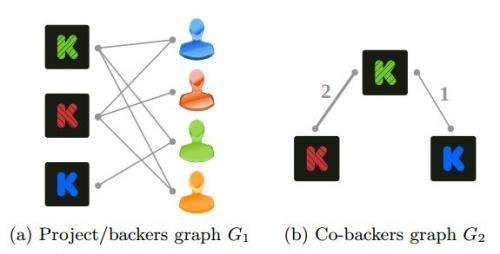October 18, 2013 weblog
Prediction model for Kickstarter tells if projects will sail

(Phys.org)—From art work to eccentric gadgets to technology projects, Kickstarter is a crowdfunding site that makes many dreams come true. Since its launch in 2009, 5 million people have pledged millions on numerous creative projects. Those who have Kickstarter projects all share one question mark, if their campaign will succeed or fail. Not knowing what is ahead, they may dream big or dread failure or at least wonder if their expectations are way over the top. Can the answer of success or failure be predicted? A Swiss team of researchers say yes and the answer can come within four hours of the project's launch. As only 44% of campaigns reach their goal overall, they said, it is of high interest for creators to know early on the probability of success of their campaign, to be able to react accordingly.
The researchers, from the School of Computer and Communication Sciences, École Polytechnique Fédérale de Lausanne (EPFL), Lausanne, Switzerland, prepared a prediction model making use of Twitter activity, number of backers, and total cash pledged to predict the success of a Kickstarter project within hours of it going live.
The group can predict with about 76 percent accuracy if the project is to be a go or a dud. Their statistical models are fed with data that includes funding and discussions on Twitter. Specifically, they used a data set pulled from over 16,000 Kickstarter campaigns that had raised a collective total of $158 million. Approximately half of them failed.
They collected Twitter data by searching for the word "kickstarter," then matching tweets to the Kickstarter project using URLs included in the tweets. They also drew upon the, number of backers, and total cash pledged to predict a projects success. In all, they mined data on over 16,000 Kickstarter campaigns and more than 1.3 million users. Their prediction model was created based on the project's popularity on Twitter, the rate of cash gathered, the number of first-time backers, and previous projects the supporters have backed. (They made use of information from each project's "Backers" page to get a list of users who pledged money, and how much they had pledged collectively. The authors completed that step every two days.)
Earlier this month, the three researchers, Vincent Etter, Matthias Grossglauser and Patrick Thiran presented a paper discussing the findings, "Launch Hard or Go Home! Predicting the Success of Kickstarter Campaigns" at the ACM Conference on Online Social Networks in Boston..
"We propose a method for predicting the success of Kickstarter campaigns by using both direct information and social features. We introduce a first set of predictors that uses the time series of money pledges to classify campaigns as probable success or failure and a second set that uses information gathered from tweets and Kickstarter's projects/backers graph." Only four hours after a campaign launch, they said, the combined predictor reached an accuracy of over 76 percent.
As research goals moving forward, the authors said their predictors at present "only output a probability of success, but act as a black box: no reason for the probable success/failure is given. While this prediction itself can already be helpful to both campaign creators and backers, as discussed in the introduction, the next step would be to give them the specific characteristics of the campaign that could be improved."
According to Kickstarter stats, 50,223 projects have been successfully funded with $833 million total dollars pledged to Kickstarter projects.
More information:
vincent.etter.io/publications/etter2013cosn.pdf
cosn.acm.org/
www.kickstarter.com/help/stats?ref=footer
© 2013 Phys.org



















